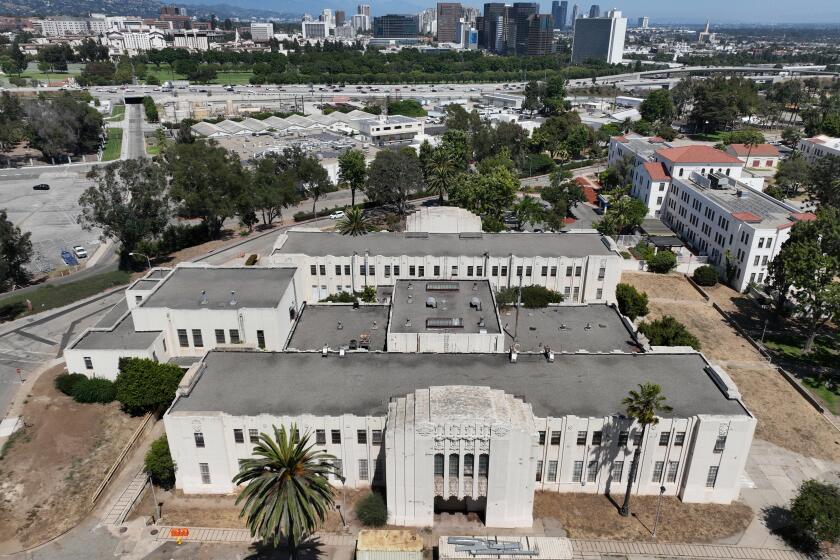L.A. City Council to again take up South-Central mall project
To its backers, the long-planned shopping mall at the southwest corner of Slauson and Central avenues would provide a crucial boost for a blighted industrial strip.
To its detractors, it’s a giveaway of taxpayer money to a Florida-based mega-developer and a politically connected community group with a dubious track record.
The Slauson Central Retail Center, conceived almost two decades ago in the aftermath of the L.A. riots, has been mired in years of litigation and has become one of the city’s most contentious development projects — a symbol of how difficult it can be to build in Los Angeles in the face of well-financed opposition.
This week, the long-deferred undertaking is scheduled to come before the City Council once again, the latest chapter in the protracted saga. Twice before the council has green-lighted the project, most recently in July, only to later rescind the approvals when legal challenges arose.
Supporters call the center — which is slated to include a supermarket, drugstore, other shops and a job-training site — a significant enhancement for a rundown “food desert,” in a low-income district sorely lacking retail outlets.
About $7 million in public subsidies are committed to the $15-million project, according to official figures. Advocates say it’s worth it. They envision 300 “living-wage” jobs at a 6.5-acre site that is now a fenced-in eyesore at a busy intersection in South Central Los Angeles.
“What the community is going to get here is a wonderful reuse of an industrial site,” said Jenny Scanlin, project manager for the Community Redevelopment Agency.
The agency seized the affected parcels through eminent domain from the former owners, including Kramer Metals, a family-run scrap-metal recycling business that has long been a fixture in the industrial zone.
Spearheading the opposition is Stanley Kramer, 72, a scrap-metal entrepreneur who insists he was cheated out of his land, for which he was awarded more than $4 million. That was less than half of its commercial value, Kramer says, though the courts upheld the award. Kramer has attacked the city plan, filing repeated lawsuits.
“This deal is as corrupt as can be,” declared Kramer, who says he has spent millions in legal fees fighting the project while enlisting community support.
Behind the deal, Kramer insists, are Councilwoman Jan Perry, who represents the district, and her allies who, according to Kramer, stand to profit from the project.
The councilwoman denies any insider dealings, and Kramer has no proof, other than Perry’s past relationship with Concerned Citizens of South Central Los Angeles, the community group that is a partner in the project. Perry was close to the group’s late founder, Juanita Tate, but Concerned Citizens and the councilwoman are no longer close, according to both sides.
“Mr. Kramer is a very nice man, but unfortunately his conclusions are erroneous,” said Perry, who added that she supported the plan but was recusing herself from voting because Kramer has sued her in connection with the project.
Concerned Citizens’ recent checkered history with the city has fed the controversy.
Last year, a judge ruled that Concerned Citizens had breached its contract with the city by failing for years to build a promised community center, including a soccer field, on a parcel it had purchased with a government grant. Instead of constructing the facility for poor youths, the city attorney’s office alleged, the group sought to make a “windfall profit” by selling the land in a real estate flip.
City officials were aware of Concerned Citizens’ breach of contract in the other project, but decided the group was “well-suited” to its role in the nearby shopping center, Scanlin said.
Among other allegations, Kramer charges that the project amounts to an illegal gift of public money — an assertion denied by city officials.
“There is no enrichment of any developer in this project,” Scanlin told the City Council in July, after a number of speakers from the public, including Kramer’s representatives, questioned the blueprint.
So far, Kramer, via his lawyer, Robert P. Silverstein of Pasadena, has successfully thwarted the plan through the unearthing of procedural shortcomings in the approval process, including alleged environmental and public notice violations.
Critics suggest Kramer’s complaints are a case of greed and sour grapes. Before seizing the land, the redevelopment agency rejected his bid to develop the property with M & A Gabaee, a well-known commercial builder whose adjoining property was also seized for the project. The two planned to build a shopping center without public subsidy, Kramer said, but city officials were dubious.
At this point, after years of battling, Kramer acknowledges that he would be willing to consider a financial settlement for a “fair offer,” though he won’t say for how much.
“I used to be a strong man,” said Kramer, who asserts that both his business and personal health have suffered. “I feel like a weak, sick man now, because of all these actions. It’s just a constant fight.”
The developers reject Kramer’s allegations of financial improprieties and political favoritism.
. “This is no sweetheart deal,” Noreen McClendon, executive director of Concerned Citizens, told the council in July. “We’ll never get repaid for all the staff time, heart and energy that we put into this project.”
Concerned Citizens is a partner in the endeavor with Regency Centers, a Jacksonville, Fla.,-based shopping mall developer. Regency hopes for a 10% annual return on its investment, said David Webber, a senior manager with the firm in Los Angeles. Neither partner would say how much of a fee would be collected by Concerned Citizens.
McClendon of Concerned Citizens did not return several calls. Her brother Mark Williams, a board member of Concerned Citizens, said the group was not interested in responding further, though he defended Concerned Citizens’ qualifications, noting that it ran more than 500 affordable-housing units.
“Our capacity is well-established,” Williams said.
As the Slauson and Central project nears final approval, no council member has expressed public opposition. Ground could be broken by next spring, but Kramer vows to continue his fight.
patrick.mcdonnell@latimes.com
More to Read
Sign up for Essential California
The most important California stories and recommendations in your inbox every morning.
You may occasionally receive promotional content from the Los Angeles Times.










